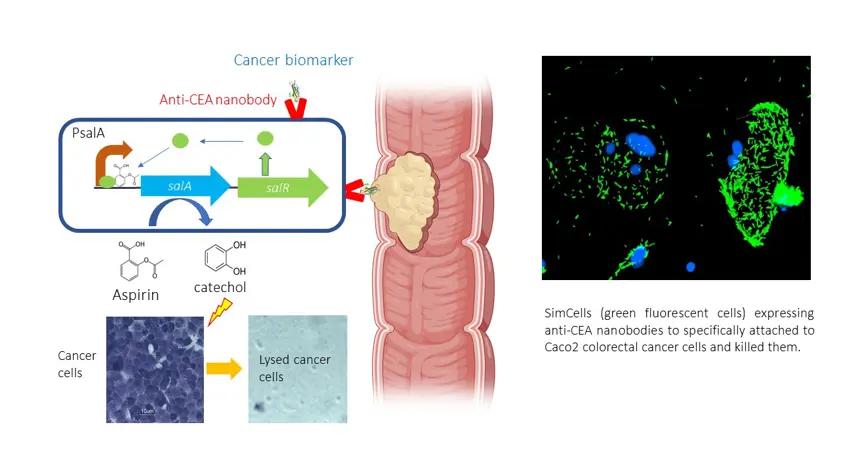30 Nov 2022
Artificial cells engineered to carry out novel cancer therapies by binding to and killing cancer cells
‘SimCells’ can be easily modified and reprogrammed to perform a variety of tasks, representing an entirely new platform for synthetic biology and potential for disease diagnostics and treatment.

SimCells Cancer Therapy Illustration
In 2020 we reported that Department scientists had developed ‘SimCells’, artificial cells which can be easily modified and reprogrammed to perform a variety of tasks, representing an entirely new platform for synthetic biology. The technology has led to the creation of a spin-out company, Oxford SimCell, focusing on applications in healthcare.
Professor Wei Huang’s research team have since engineered SimCells as artificial immune cells to carry out novel cancer therapy, and tests suggest they are a safe and programmable 'live drug' for use in disease treatment. He says, “We expressed various nanobodies on the surface of SimCells, enabling them to specifically bind and kill cancer cells. To prove the concept, we have developed SimCells as a potential 'live drug' to treat colorectal cancers.”
SimCells have also been engineered as ‘biosensors’ to detect Nitric Oxide (NO), an important disease biomarker found in many chronic inflammatory diseases – an innovation with enormous potential for diagnosis and treatment.
Further interdisciplinary research will involve a collaboration with Professor Adrian Harris in the University of Oxford’s Oncology Department, Medical Sciences Division, investigating SimCell treatment for breast cancer. Professor Huang’s team will also continue to work on developing the artificial cells to function longer, as well as finding out how to repair them, get energy to them, and prevent them from wearing out.
The research has been carried out as part of the EPSRC-funded project ‘Development of SimCells as building blocks for synthetic biology’.
Related papers
Lim B, Yin Y, Ye H, Cui Z, Papachristodoulou A, Huang WE. Reprogramming Synthetic Cells for Targeted Cancer Therapy. ACS Synth Biol. 2022 Mar 18;11(3):1349-1360. doi: 10.1021/acssynbio.1c00631
Chen XJ, Wang B, Thompson IP, Huang WE. Rational Design and Characterization of Nitric Oxide Biosensors in E. coli Nissle 1917 and Mini SimCells. ACS Synth Biol. 2021 Oct 15;10(10):2566-2578. doi: 10.1021/acssynbio.1c00223




